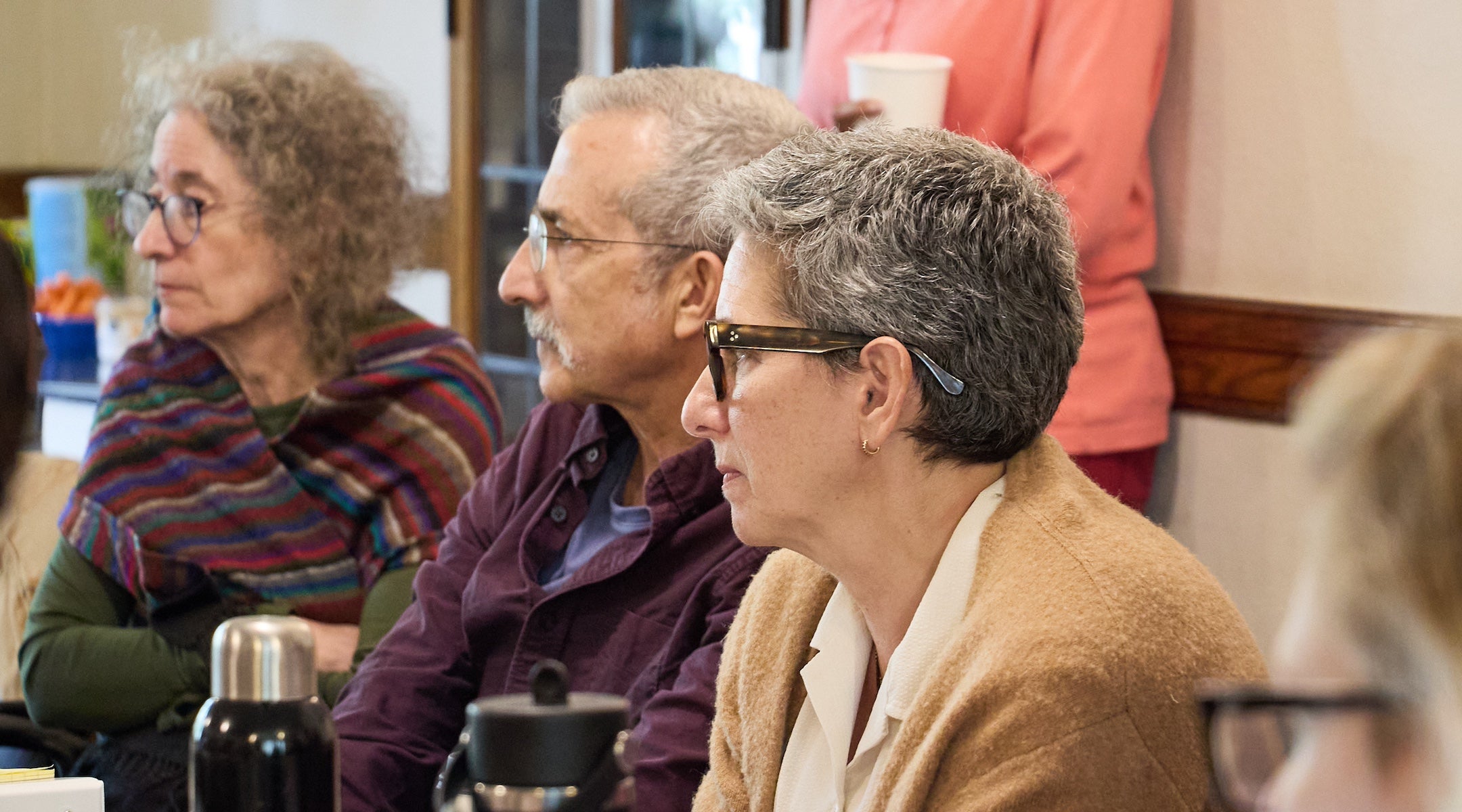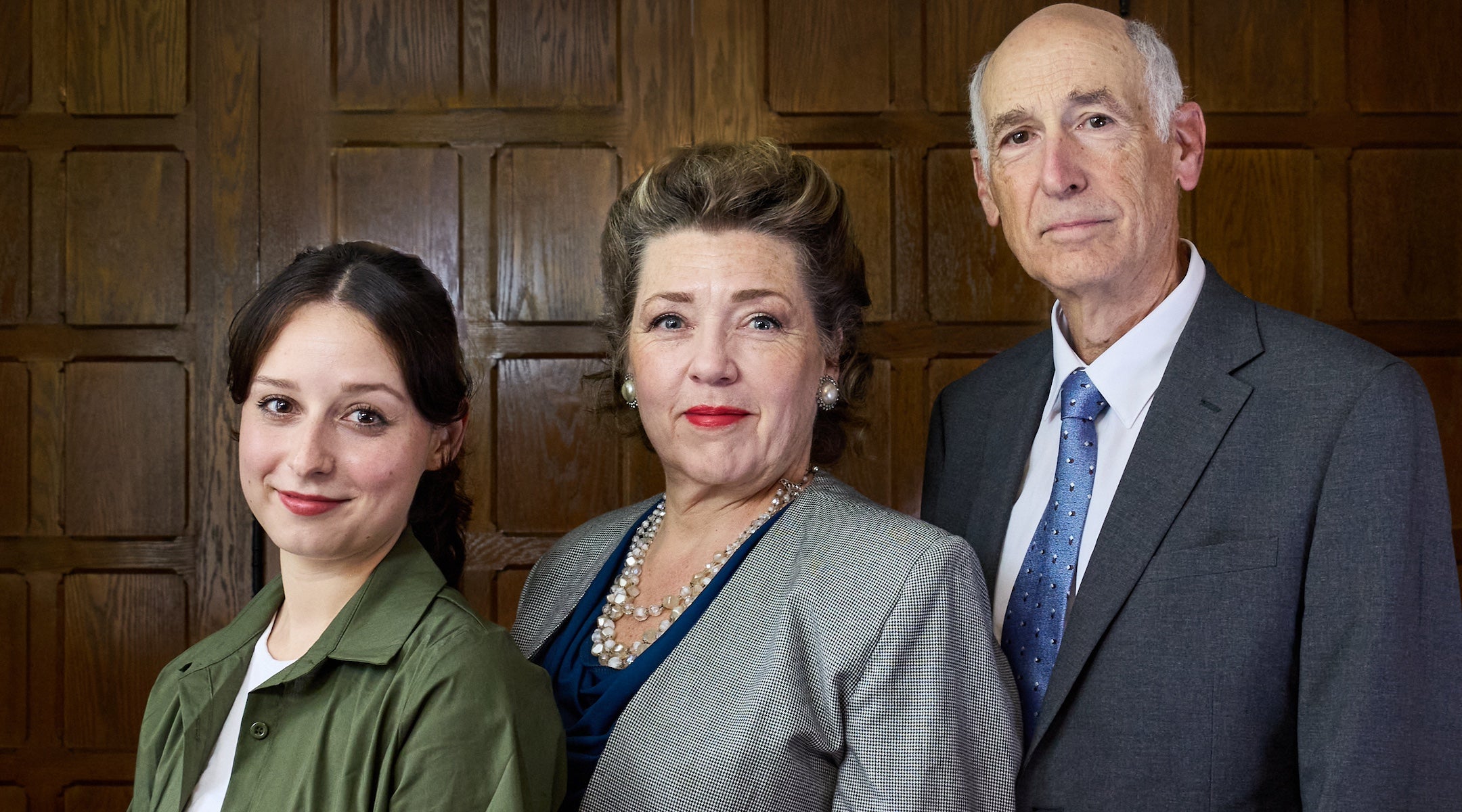You had to have been born in the 1980s or earlier to have a firsthand memory of the night Yitzhak Rabin was shot 30 years ago this week. For most young adults, Rabin’s assassination is something they learned about in history class, at a day school assembly or from their parents.
That gap — between an event as personal experience and an event as historical memory — is particularly pronounced this year. With the peace process that Rabin championed seemingly more remote than ever and with a ceasefire in Gaza barely holding, parents, teachers, artists and activists may be struggling to explain why the death of an Israeli prime minister in the Clinton years even matters.
“This is an event that cannot be something that only a generation remembers, but it has to be an event that is cemented not only Israeli history but in Jewish history,” said Barak Sella, 40, who served as spokesperson for the National Memorial Rally for Rabin in Israel and is a founder of the Stand for Democracy coalition, which promotes Rabin’s legacy in the United States.
Sella is also the editor of a newly translated collection of Hebrew poetry, “Class of 95,” that wrestles with the trauma of the assassination and its relevance to the moment. It and a new musical play being staged in Washington, D.C., “November 4,” use different media to convey a similar, pressing idea: Remembering Rabin and what he stood for in life and death is essential for closing festering wounds and imagining a way forward for Israel and its supporters.
“The Rabin assassination symbolizes a failing point of our democracy, and something that we need to turn into a symbol if we want to be able to have the ability to be a Jewish sovereign nation,” said Sella. “Jews have an ability to have very strong memories of events that happened very far in our past, even traumatic memories, and turn them into symbols of growth.”
Barak Sella is the editor of “Class of 95.” an anthology of Israeli poetry about the assassination of Yitzhak Rabin. (Courtesy)
For the creators of the anthology and the play, Rabin’s killing at the hands of a Jewish extremist represents not only a mortal blow to peace between Israelis and Palestinians, but a shocking example of internal Jewish strife. And while these mostly left-leaning artists acknowledge the profound disagreements over Oslo, they say he represented the kind of inspired thinking Israel can use in the wake of Oct. 7.
“Rabin had vision and moral imagination — things in short supply today,” said Danny Paller, who wrote the music and lyrics for “November 4.” “That’s what makes this story relevant now. We need to ask: where do we get hope from? How can we build a future?”
Paller, who has lived in Jerusalem since 1986, recalls being at his office the night Rabin was killed — just five days after his first daughter was born. “It was this rush of joy, despair, anger, disbelief,” he said. “Our family changed that week. Our country changed that week.”
“November 4” premiered in 2022 in Israel in a stripped-down cabaret version translated from English to Hebrew. Four women played every role, occasionally stepping out of character to share their own memories of the assassination. “It was profoundly Israeli,” says Paller. “They felt they had just experienced something deeply personal — but in a very different artistic language.”
The new U.S. production, presented by Voices Festival Productions and running Nov. 1-Dec. 7 at Universalist National Memorial Church in Washington, includes characters playing Rabin, his wife Leah, and his assassin, Yigal Amir. Rabin, a hero of Israel’s war of independence who once threatened to “break the bones” of Palestinian rioters, shook hands with the Palestinian leader Yasser Arafat on Sept. 13, 1993. The prospect of territorial compromise with the Palestinians after decades of bloody conflict enraged the Israeli right. Amir, a devout religious Zionist and ultranationalist, sings in the play, “We have a mission/To save our nation/That is the highest height.”
“I don’t have empathy for [Amir],” said Myra Noveck, the Jerusalem-based reporter and researcher for the New York Times who wrote the book for the musical. “But you have to understand the other side — even when they are wrong — without dismissing them as crazy or incompetent.”
By focusing on Israel’s bitter debate about the Oslo Accords and even on Rabin’s flaws as a politician who often dismissed the concerns and fears of his opponents, she said she wanted to retrieve the late prime minister from a “death cult” that treats him as a martyr while ignoring what he stood for.
“We have to preserve ideas, not just mourn people,” she said, lamenting a right-wing government that includes far-right figures like Itamar Ben-Gvir, a leader of the protests that some say inspired Rabin’s killer. “Rabin foresaw that holding onto the territories would infect the rest of Israel — that you can’t deny rights to others and still maintain a democracy. That’s what we’re seeing now.”
“We realized there was a straight line from Rabin’s moment to the crisis we are witnessing now,” said Paller, referring to the Oct. 7 attacks, the war that followed and the bloodshed Rabin was trying to avert. “The play reminds us that hope and moral courage are never irrelevant. They are urgently needed.”
The 40 poems in “Class of 95” offer an even wider lens on the assassination and the overheated political climate then and now. Ronny Someck’s “Kings of Israel Square, The Day After” was written on Nov. 6, 1995, and remembers the makeshift memorials put up by mourners at the site of the shooting. Yudit Shahat’s poem, “God’s Terrible Garden,” is dedicated to a Canadian-Palestinian physician whose daughters were killed in the Gaza War of January 2009. And in “Proper Rest,” Shoshana Karbasi imagines Rabin’s funeral as an occasion for national healing — “because there is one pain shared by all.”

Myra Noveck, far left, and Danny Paller are the co-creators of “November 4,” directed by Alexandra Aron. (Peggy Ryan)
When asked what he thinks may be lost in translation between Hebrew and English — and what Diaspora Jews may not understand about Israelis — Sella replied that in Israel the assassination remains an “open wound.”
“The trauma has not been processed,” said Sella. “Rabin’s assassination affected people’s self-confidence in our democracy and the ability to strive for peace. We don’t talk enough about the fact that Rabin was killed by an Israeli citizen, and that brings up the question of what we actually want as a people.”
Sella and the creators of “November 4” also insist on the power of art to open up conversations in a way that journalists and historians can’t.
“People don’t read op-eds if they don’t already agree with them,” said Noveck. “Theater talks to the gut. It lets you peel back the layers — the walls people build around themselves — and get to the onion.”
Yehuda Kurtzer, president of the Shalom Hartman Institute, makes a similar point in a foreword to the poetry collection, writing that trauma “needs poetry.” Kurtzer will be one of the speakers at a Rabin memorial event and book launch of “Class of 95” at Temple Emanu-El in New York on Tuesday.
The Emanu-El event is one of a number of programs marking the anniversary on Tuesday. UCLA’s Y&S Nazarian Center for Israel Studies is holding a webinar with Itamar Rabinovich, one of Rabin’s biographers. New Jewish Narrative will mark the anniversary with a webinar about how Rabin’s murder reshaped American Jewish politics, identity and engagement with Israel.
Like Sella, Kurtzer also warns that memories of Rabin and the hope he embodied are fading. He cites a poem in the collection by Daniel Baumgarten, which asks, “Dear students / please raise your hands / what does it feel like to have peace / within reach?” The answer is the poem’s title: “Silence.”
“I worry for American Jews that in forgetting him, all we see are the inevitabilities of what has gone wrong in Israel over the past several decades, and not the availabilities of alternative endings to this story that once presented themselves and could, with the benefit of our imagination, inspire us again,” Kurtzer writes.
Sella, who splits his time between Tel Aviv and Boston where he is a research fellow at Harvard’s Kennedy School, was just 10 years old when Rabin was killed. Born in the United States and newly arrived in Israel, he experienced the assassination as a formative event. “In many ways, my parents came to Israel because Rabin came into power,” he recalled. “It seemed like a moment of hope. The assassination was a shock, but also an early lesson in what it meant to be part of Israeli society and to engage with its democracy.”
But he notes a worrying gap: The generation that did not live through the assassination lacks the tools and context to understand its meaning. “We’re at a moment where this is no longer personal memory but historical memory,” he said. “If we don’t create spaces for the next generation to engage with this event, they won’t have the language to talk about it, to understand its significance, or to see it as a lesson for the future.”
Keep Jewish Stories in Focus.
(JEWISH REVIEW) has documented Jewish history in real-time for over a century. Keep our journalism strong by joining us in supporting independent, award-winning reporting.




